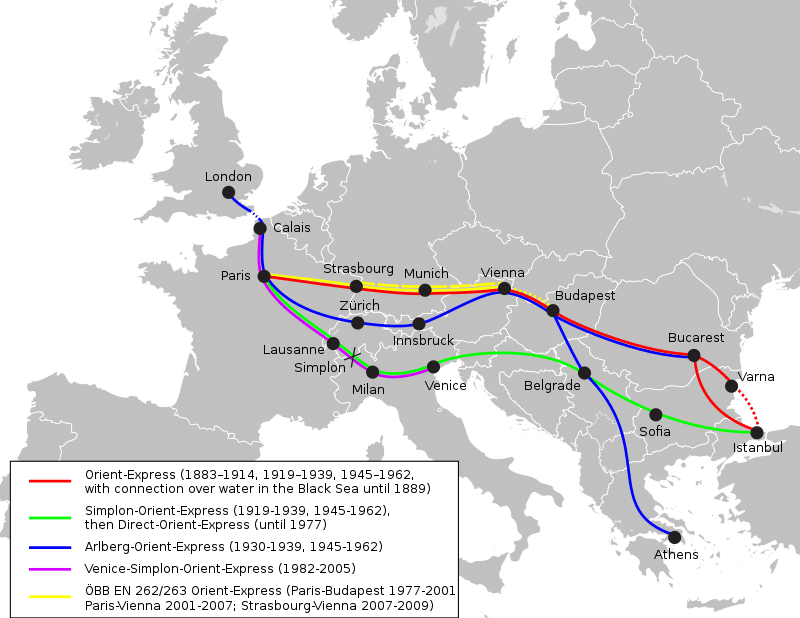Prior to biometric passport checks, the luxury train operator reduced services, forcing passengers to board in Paris.
Passports were not required for British passengers when the Orient Express first ran in the 19th century; instead, they just needed a copy of the Thomas Cook Continental Itinerary.

Yet for modern travellers searching for the nostalgia of the opulent train excursion that served as an inspiration for Agatha Christie and Hollywood, Brexit and 21st-century biometric checks are dying off the romanticism of crossing borders.
Because it is now extremely difficult to cross the border into Calais, Belmond, the company that operates the current Venice Simplon-Orient-Express (VSOE), has chosen to discontinue the London-to-Folkestone portion of the route.
Up until today, travellers could take the British Pullman service from London’s Victoria station to Folkestone in art deco-styled carriages. Then, as night falls, they get ready for dinner. A compartment in one of the vintage 1929 cars costs between £3,530 and £10,100 per person, so evening wear is required and jeans, as Hercule Poirot would expect, are forbidden. From there, they board coaches to cross the Channel and connect with Belmond’s continental train at Calais.
Belmond faces an intolerable risk as a result of the coach transfer because there is no other alternative for their clients to avoid delays when crossing the English Channel. At the start of the Easter break two weeks earlier, travellers, including school coach parties, had to wait up to 14 hours at Dover, and people also faced queues for Le Shuttle.
Things may get worse, Belmond fears, because the UK and EU are planning new biometric passport checks and extra red tape
A spokeswoman for Belmond stated, “We are changing operations in 2024 ahead of enhanced passport and border restrictions.” “We want to eliminate any chance for our customers’ travel to be disrupted, including delays and missed train connections, and to offer the greatest level of service, as frictionless and unhurried as possible.”
With the introduction of the EU’s new biometric Entry/Exit System (EES), most travellers over the English Channel who do not already reside in the EU will be required to produce their fingerprints and facial recognition data at the border rather than having their passports stamped.
If the technology is reliable, travellers above the age of 12 might be able to use electronic entrance gates, which could save them some time. Yet, given that even infants will require care,
Yet, since even infants will be required to supply biometric information, there is doubt in the tourism sector about how the checks would actually function. EES was supposed to start this year, but it’s more likely to do so after the 2024 Summer Olympics in Paris.
The EU and the UK will soon require travellers to submit pre-travel authorization documents similarly to the Esta system used in the US. Under Etias, the European Travel Information and Authorization System, British travellers will pay €7 to provide European authorities with personal information that is not listed on their passports, such as criminal convictions, educational background, and parents’ first names.
European citizens will furnish the British government with similar information for the UK’s Electronic Travel Authorization (Eta) programme, although Whitehall has yet to set a fee for it.
Suitable for cosy mystery fiction, this is not. According to Mark Smith, creator of the railway travel website The Man in Seat 61, “technology has made many things easier.” “Yet crossing borders is the one thing that has become more difficult. In the past, you could cross any border with your passport in hand. All of a sudden, everyone is asking for your fingerprints like you’re a criminal.
It was a “big shame” to lose the British Pullman, he remarked. “The British Pullman was the hors d’oeuvre; it set you up with smoked salmon and champagne on the traditional boat-train route that travellers travelling on the Orient Express would have taken in the 1930s, which ran from London to Folkestone. arriving in Calais in time to board the continental train it was lovely to get dressed for dinner.
Londoners will be able to go to Paris on the cutting-edge high-speed Eurostar and connect to the VSOE there, but “it’s not the same,” he said. If that aspect of the experience is lost, it would be a terrible shame.
In comparison to the original service, the VSOE is not totally authentic, he continued. “Compared to what most people think, it was a much more professional train. Whatever Kenneth Branagh may think, the real thing would not have included pianos, lounges, bars, or even a balcony. You would have had sleeping vehicles and spent the majority of your time in your compartment in daytime mode.
The first Orient Express, which ran from Paris to Vienna, started service in 1883.
The term was given to trains that travelled the southern route from France.
After reading about the train getting delayed in snow for five days, Christie was moved to create her book Murder on the Orient Express, which takes place aboard the Simplon Orient Express, which launched in April 1919.
When James Sherwood purchased a few 1929 sleeper cars at auction in 1977 and started operating the route from London in 1982, the Venice Simplon-Orient-Express was once again in operation.
Despite the expensive ticket costs, Smith, a former station manager at Charing Cross, claimed that the VSOE was not exclusive. “The majority of individuals are spending money on a particular occasion since it’s an unforgettable experience. Whatever I paid in 2003, I questioned whether any trip could be worth three grand, or whatever it was I paid then.
But here I am, married, with a mortgage, children, two cats, and a dog, 20 years later.
We had only been dating for six months when this powerful magic struck.
Other train trips have also come to an end as aresult of Brexit; this summer, the Eurostar service from St. Pancras to Disneyland Paris
will be discontinued.
Tom Jenkins, CEO of Etoa, the European Travel Association, claims that the UK is also losing out on tourists from other countries. “People are starting to drop the UK as a gateway to a European tour,” he claimed. “While it’s not the only reason, in the past we served as the main entry point for travellers entering Europe from the United States, Japan, and other countries.
Murder on the Orient Express, a 1974 motion picture, starred an all-star cast, including Albert Finney in the role of Hercule Poirot.
“It was made abundantly clear in 2018 that a hard Brexit would require passport checks for UK people. This is really how everyone is getting bit by Brexit.
According to Jenkins, the epidemic obscured many of the issues caused by the Brexit border. Easter 2023 was the new regime’s first real test, and we watched it brutally fail in Dover.
He stated that EES and Etias “could be very quick”. However, it can take a very long time to process the first time you do it. It might actually be a bottleneck.
Join us in helping to bring reality and decency back by SUBSCRIBING to our Youtube channel:
https://www.youtube.com/channel/UCQ1Ll1ylCg8U19AhNl-NoTg
and SUPPORTING US where you can: Award Winning Independent Citizen Media Needs Your Help. PLEASE SUPPORT US FOR JUST £2 A MONTH







